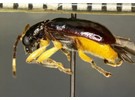U.S. Customs and Border Protection agriculture specialists at the Pharr International Bridge discovered a rare pest, a first in nation discovery, in a shipment of fresh fruit.
“Our agriculture specialists help protect American agriculture and contribute to the nation’s economic security by denying entry to invasive species not known to exist in the U.S.” said Port Director Carlos Rodriguez, Hidalgo/Pharr/Anzalduas Port of Entry.
 A specimen of Cochabamba sp., a First in Nation pest intercepted by CBP agriculture specialists at Pharr International Bridge.
A specimen of Cochabamba sp., a First in Nation pest intercepted by CBP agriculture specialists at Pharr International Bridge.
On May 2, 2022, CBP agriculture specialists at the Pharr cargo facility conducted an inspection on a commercial shipment of fresh fruit arriving from Mexico, which resulted in the discovery of a live pest within boxes of mangosteen. The insect was submitted for identification to a U.S. Department of Agriculture entomology laboratory and the initial identification was later confirmed as Cochabamba sp. The Cochabamba sp. is a species that belongs to what is called the leaf beetle family. This pest can cause agricultural and economic damage as their larvae skeletonize the leaf surface and adults eat plant and tree leaves and cause damage to foliage. This pest is found in central and south America and its travel pattern indicates that it is migrating north. The shipment was refused entry and returned to Mexico.
According to USDA entomologists, this pest has never been found at any of the nation’s ports of entry.
The interception is an example of the diligent work CBP agriculture specialists do on a daily basis to fulfill CBP’s agriculture mission, which is crucial in preventing foreign pests from establishing in the United States. Pests that are not known to occur in the U.S. may be detrimental to the nation’s agriculture industry.
